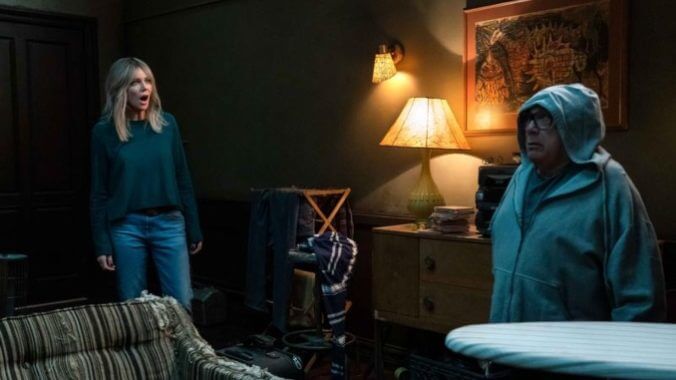Always Sunny’s 16th Season Proves Idiocy Doesn’t Age
Image courtesy of FX Networks
The sun has shined bright for the Paddy’s Pub gang’s nearly 20-year run. The most lovable, despicable people to grace television, Mac (Rob McElhenney), Dennis (Glenn Howerton), Charlie (Charlie Day), Dee (Kaitlin Olson), and Frank (Danny DeVito) are back in Philly for a season that kicks the pandemic to the curb. Fresh off the heels from a pandemic-centric and story-driven 15th season—and coinciding launch of the ongoing The Always Sunny Podcast—It’s Always Sunny in Philadelphia’s latest run takes off the post-COVID training wheels and rides back to its glorious, unhinged episodic state. Most of the gang may be well into their forties, but Season 16 proves that idiocy becomes riper with age, much like fine wine. To paraphrase Matthew McConaughey: “That’s what I love about the gang, man. I get older. They stay the same age.
The last viewers saw the gang, they caused a wee bit of mayhem in Dublin, Ireland, during peak COVID times. Now, back in the States as their unapologetically awful selves, they take aim at inflation, celebrities, and themselves. By taking the utmost advantage of modern American culture, the Always Sunny writers deliver another hysterically funny comedic round, exemplifying why these terrible people are the best at being the worst.
The premiere episode, “The Gang Inflates,” tackles how the 2021 economic inflation surge affected the gang…that is, if Mac and Dennis knew what inflation meant in the first place. Frank schools the clueless Mac and Dennis on the definition of inflation, using a theoretical squirrel with fancy nuts as an example. With a newfound understanding of the current economic state, Mac and Dennis come up with an inflatable furniture scheme to get quick cash. Of course, it’s only a short matter of time before matters become obscenely insane. The following episode that aired alongside it, “Frank Shoots Every Member of the Gang,” once again has the gang ridiculing the—still too hot—subject of American gun control, or lack thereof.
Both episodes are as funny as they are ingenious, establishing the rhythm for the rest of the season. Throughout the six episodes sent for critics, Sunny 16 finds equilibrium in the plots wavering between classical absurdity or ribbing modern America, with a chaotic crux in tow. Sunny’s sharp-as-nails writing team, consisting of Day, Howerton, McElhenney, David Hornsby, and veteran writers Nina Pedrad, Megan Ganz, and Rob Rosell, combine silly concepts as the foreground for relevant or unspoken social commentary.
The upcoming “Celebrity Booze: The Ultimate Cash Grab” is a notable one that will delight Sunny fans who have been waiting a decade for Aaron Paul’s dream to star on the show to come true. The episode features Breaking Bad’s Bryan Cranston and Aaron Paul as fictionalized versions of themselves to bring about a commentary on celebrities who cash in on their public image through branded alcohol, something Sunny’s creators are guilty of doing themselves. As expected, Paul and Cranston are in on the fun and provide delightful performances worthy of a “Best Guest Star in a Comedy Series” Emmy. Not to give too much of that episode away, but the starring duo cook up a fun fictional dynamic that fits the series’ demented nature.
-

-

-

-

-

-

-

-

-

-

-

-

-

-

-

-

-

-

-

-

-

-

-

-

-

-

-

-

-

-

-

-

-

-

-

-

-

-

-

-








































